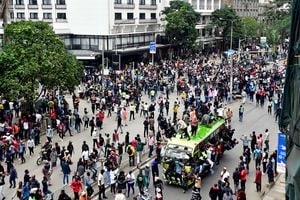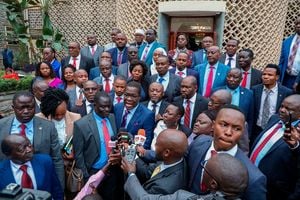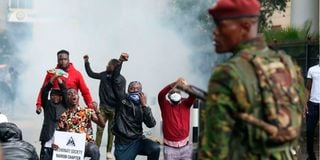
Protesters engage police officers during Anti-Finance Bill demonstrations in Nairobi on June 20, 2024.
As many as 17 regions across the country witnessed protests as young Kenyans turned up to voice their opposition to the Finance Bill, 2024 on Thursday.
They swarmed streets from early morning to express displeasure with the bill.
The protests took place in Nairobi, Kisumu, Mombasa, Eldoret, Nakuru, Kericho, Lodwar, Kilifi, Nyeri, Meru, Embu, Nanyuki, Kisii, Kakamega, Machakos, Taita Taveta and Kiambu.
It did not matter if their MPs were allied to the ruling coalition or the opposition. Compared to the protests on Tuesday, Thursday’s masses were braver in the face of an onslaught that came in the form of mounted police, tear gas, batons, water cannons and bullets.
Outside the Nation Centre in Nairobi, NTV journalist Ibrahim Karanja faced off with police officers for assaulting protesters.
As they engaged police in running battles, the protesters chanted, carried placards and sang.
With the clarion call being “Occupy Parliament”, police ensured the crowds could not access the National Assembly.
Inspector-General of Police Japhet Koome condemned the action of the protesters.
“With respect to the...Constitution stipulating the right of citizens to assemble, demonstrate and picket, the service will neither condone nor approve efforts to occupy critical government infrastructure or disrupt parliamentary proceedings,” he said in the evening.
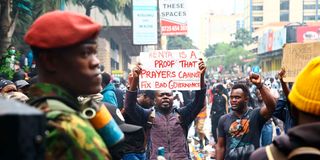
Demonstrators display placards during the Anti-Finance Bill protests in Nairobi on June 20, 2024.
Police officers blocked the roads leading to Parliament.
“We shall have other ways to get to Parliament and occupy it,” a protester said.
Many businesses in the city centre closed for fear of looting.
The marchers shouted and blew whistles and vuvuzelas every time they spotted a police vehicle. They retreated and regrouped shortly afterwards whenever a teargas canister was hurled at them.
Comedian Mulamwah, influencer Azziad Nasenya, media personality Willis Raburu and musician Octopizzo joined the protests.
The demonstrations are markedly different from what happened for looting and damage to property were minimal.
Protesters poured into streets in Eldoret in what could only be equated to the euphoria that greeted the declaration of Dr William Ruto as Kenya’s fifth president in August 2022. They were cheered on by onlookers and bystanders.
The protesters reminded their elected leaders that they were watching them as they voted on Thursday afternoon.
Shortly before noon, they converged at the Zion Mall junction on the Eldoret-Malaba highway, bringing business to a standstill.

Youths demonstrate against the Finance Bill 2024 in Eldoret town, Uasin Gishu County on June 20, 2024.
A wheelbarrow, the symbol of the ruling United Democratic Alliance (UDA), was brought down on Oginga Odinga Street.
“We have just destroyed the symbol of lies and broken promises,” some said.
The marches began early at Kondele Roundabout, in Kisumu, with most of the protesters dressed in black and waving placards.
They later marched to the city centre through Kenyatta Avenue, disrupting traffic.
The protesters passed through Kibuye market, the main bus terminal and Ang’awa Street before finding their way into the CBD through Oginga Odinga Street.
Some businesses quickly closed when the demonstrators poured into the town centre.
Earlier, City Manager Abala Wanga, told police officers not to use excessive force against the marchers.
“It is imperative that security personnel exercise restraint. Their primary role should be to prevent unlawful activities like vandalism, disruption of businesses and normal city operations,” Mr Wanga said.
According to Mr Obungu Owich, who was among the protesters, locals took the decision to join the rest of the country in making their voices heard.
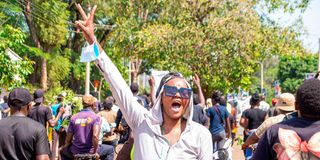
Anti-Finance Bill protesters demonstrate on the streets of Kisumu on June 20, 2024.
In Kilifi, thousands of young people poured into the streets to add their voices to those opposed to the Finance Bill, 2024.
The protests started with university and college students but the crowd grew bigger, with boda bodas joining.
They walked from Pwani University to the town market and returned to town. The marchers made several stops, chanting and singing. No incident of violence was reported.
At some moment, they blocked access to the Kilifi Huduma Centre and later headed to the governor’s office.
In Voi, Taita Taveta County, protests that had been planned failed to gain the momentum.
Despite a group showing up for the protest, it was short-lived as the crowd failed to draw more people.
Tens of heavily armed police officers patrolled streets.
Mombasa, which witnessed hundreds hit the streets in protest on Wednesday, also recorded marches on Thursday.
A crowd started gathering on Moi Avenue in preparation for the demonstration at 12:30pm.
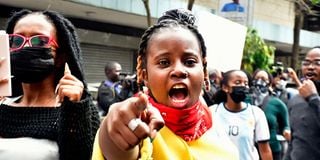
Anti-Finance Bill protesters demonstrate on the streets of Nairobi on June 20, 2024.
Many towns in Mt Kenya witnessed protests against the Finance Bill, 2024.
Peaceful protesters in Nyeri, Meru and Nanyuki were escorted by police officers. No tear gas canisters were lobbed at the groups.
Ms Nkirote Murungi, who organised the march in Meru town, said unemployed young people are tired of empty promises “from a government that never gets tired of taxing us”.
Marchers were on Embu town streets for the better part of morning, accusing the government of oppressing them.
They obstructed motorists as they marched, causing a traffic gridlock.
Business was halted as traders hurriedly closed down their shops.
Tension mounted as the demonstrators shouted, demanding the immediate resignation of President Ruto.
“Ruto must go! Ruto must go!” they shouted, paralysing transport in the usually busy town.
The protesters accused the government of burdening Kenyans with taxes despite the high cost of living. They demanded that the taxes be cancelled.
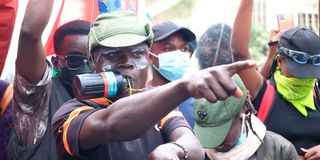
Protesters engage the police during the Anti-Finance Bill demonstrations in Nairobi on June 20, 2024.
Transport was disrupted in Nyeri as hundreds of young people poured into the streets. They marched in the town, frequently stopping to be addressed by their leaders.
Protesters in Nanyuki carried twigs and placards, accusing local lawmakers of betrayal.
They at one time blocked the Nanyuki-Meru road, calling on the MPs to reject bill.
They took their protests to the offices of the governor, NG-CDF, Woman Representative and Senator.
Some went to the residence of area MP Mwangi Kiunjuri, saying he would be taken as a traitor if he votes for the bill. There was no damage to property.
The protests began in Kisii around noon, disrupting traffic on many roads. The protesters chanted and carried placards castigating President Ruto and National Assembly Majority Whip Silvanus Osoro. Police largely kept off.
The protesters, mostly young men and women, urged MPs not to pass the Finance Bill, 2024.
In Kakamega, hundreds poured into the streets protesting the bill and telling MPs to pass it at their own risk.
A group of university students, traders, boda bodas, ward representatives and lawyers in black T-Shirts met at Muliro Gardens before beginning the march in the town.
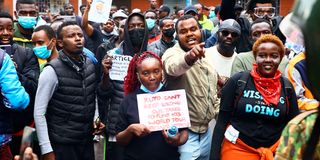
Demonstrators display placards during the Anti-Finance Bill protests along Koinange Street in Nairobi on June 20, 2024.
Waving placards written “Occupy Kakamega County, Reject the Finance Bill, 2024” they paralysed business in the town centre, with shops hurriedly closing.
Some protesters reported seeing police officers in civilian clothes taking part in the march though journalists could not verify the claim.
Officers in uniform watched the demonstrators from afar.
The protesters equated Dr Ruto to controversial preacher Paul Mackenzie of the Good News International Church, saying the two are leading Kenyans to their death.
“To be honest, there is no difference between Mackenzie and Ruto because they are starving Kenyans,” one of them shouted.
Hundreds of Nakuru residents took to the streets to protest the bill and the high cost of living.
Armed police officers were stationed at government establishments, including State House and the Rift Valley Regional headquarters, on Government Road.
Transport on the busy Nakuru-Eldoret road was paralysed for hours when crowds blocked it.
They left without causing damage to property. Police officers did not disperse them.
Report by Rushdie Oudia, Sammy Kimatu, Gitonga Marete, George Munene, Mercy Mwende and Mwangi Ndirangu, Mercy Koskei, Shaban Makokha, Steve Otieno, Loise Wangui, Caroline Wafula, Wachira Mwangi, Lucy Mkanyika, Hilary Kimuyu, Jurgen Nambeka, Ruth Mbula and Stanley Oduor

